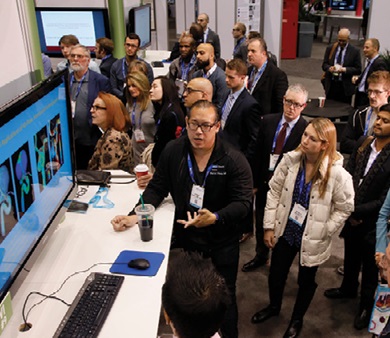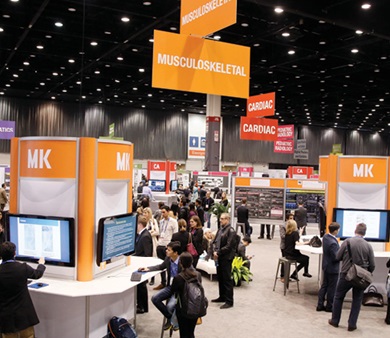Discover and Learn at RSNA 2018
RSNA 2018 offers educational courses in a variety of formats across all career levels and subspecialties. Here are just a few courses that you might want to include in your meeting agenda for the week.
Education couses
RSNA 2018 offers educational courses in a variety of formats across all career levels and subspecialties. Here are just a few courses that you might want to include in your meeting agenda for the week.
Monday
Special Interest Sessions
The RSNA Board of Directors has determined these courses to be of particular importance.
- Quantitative Imaging Applications in Screening, Treatment Selection, and Treatment Assessment - The Need for Standardization in the Era of Personalized Medicine
- Imaging Cognition 2018: Addiction
- High-value MRI: Updates from the February 2018
ISMRM-RSNA Co-provided Workshop - Demystifying Machine Learning and Artificial Intelligence for the Radiologist
- Academy for Radiology and Biomedical Imaging Research Imaging Shark Tank Session
- Integrated Diagnostics-Combining Genomics, Pathology and Radiology, The Future Now
High Impact Clinical Trials
- Efficacy and Safety of Transdermal, Sublingual, and Oral Nitroglycerin Administration for Coronary CT Angiography: Results of a Prospective Randomized Trial
- Optoacoustic Imaging (OA) is Helpful in Predicting Breast Cancer Molecular Subtypes
- Safety and Tolerability of High-Specific-Activity I-131 MIBG (AZEDRA®) in Patients with Iobenguane Scan Positive Cancers: A Pooled Analysis Across AZEDRA Clinical Studies
Molecular Imaging (MI) Symposium
Experts in MI will present a full day of sessions focusing on the basics of MI, oncologic MI applications, neurological MI applications and interventional oncology along with a Special Interest Session.
Australia and New Zealand Present: Clinical Radiology and Radiation Oncology
Presentations will highlight education, training and reform initiatives in Australia and New Zealand, radiation oncology and interventional radiology, vascular interventional research and the role of iron in neurodegeneration.
Tuesday
Quality Improvement Symposium
Developed by the RSNA Quality Improvement Committee, these sessions help advance the science of quality value proposition to radiologists. Participants can earn a Quality Essentials Certificate for each session by scoring 80 percent or higher on the related test.
- Value in Radiology
- The Business Case for Quality
- The Importance of Effective Communication
The Nordic Countries Present: Radiology the Scandinavian Way, Future Potentials
Presentations will highlight health care and radiology in the Nordic countries, mammography screening in Denmark, education with simulation-based training models, challenges in education in emergency radiology and will preview the 2019 Nordic Congress in Radiology.
Wednesday
RSNA/ESR Sports Imaging Symposium
RSNA and ESR are sponsoring a full day of sessions on upper and lower extremity injuries, musculoskeletal interventional procedures and postoperative imaging of sports injuries.
Thursday
Fast 5 Session
Five speakers will present for five minutes each on topics selected. Follow the conversation on social media at #RSNAFast5. Topics include:
- Patient-friendly Imaging Appropriateness Criteria Summaries
- Patient Feedback for Radiology Reports: Are We Prepared to Be Yelp’d?
- Mentorship/Sponsorship of a New
Generation of #RADxx & #RADxy through Social Media - Human-Centered Design in Radiology
- Mirage of AI Substituting Radiologists: Lessons from When AI Got it Wrong
Throughout the Week
Bolstering Oncoradiologic and Oncoradiotherapeutic Skills for Tomorrow (BOOST) Program
Leaders in radiation oncology, diagnostic radiology, biology, neuroradiology and physics provide three days (Monday through Wednesday) of concentrated courses focusing on specific diseases.
Case-Based Interactive Series
Each interactive series comprises multiple sessions intended to aid self-assessment and increase knowledge. Topics include abdomen, breast, cardiac CT, MR, musculoskeletal, nuclear medicine, neuroradiology, pediatric radiology, thoracic imaging and ultrasound.
Controversy Sessions
Sessions focus on topics that are particularly controversial and present opposing viewpoints. Topics include breast screening, prostate cancer imaging, imaging of trauma, non-small cell lung cancer, gadolinium for MR examination, and stenotic vascular disease, among others. High audience participation is expected.
Hands-On Workshops
In these 1 1/2–hour workshops participants learn proper use of medical equipment through demonstrations. Topics include MRI-guided breast biopsy, techniques for interventional sonography and thermal ablation, big data and 3D printing.
Hot Topic Sessions
Sessions are identified across all subspecialties that cover late-breaking discoveries. Highlights include 3D printing in urologic oncology, managing ductal carcinoma in situ, advances in cardiovascular, neurological and oncologic PET imaging, cardiometabolic imaging and imaging of inflammation.
Industry Presentations
Attend educational programming provided by RSNA 2018 exhibitors at McCormick Place during the annual meeting. Access session information for Corporate Symposiums, Lunch and Learns, showcase presentations and vendor workshops at Meeting.RSNA.org. CME credit, if provided, will be through a third party provider, not RSNA.
RSNA Diagnosis Live™
Expert-moderated sessions feature a series of interactive case studies to challenge radiologists’ diagnostic skills. Participants submit and discuss responses in a fast-paced game format. Bring your own charged mobile device to compete.
RSNA 2018 attendees are encouraged to bring their laptops and other mobile devices to sessions, exhibits and hands-on sessions throughout the week.
Explore Thousands of Posters and Exhibits in the Learning Center
Located in Lakeside Center East, Level 3, the Learning Center houses thousands of education exhibits and scientific posters covering a range of subspecialties. Digital scientific posters and Education Exhibits will be displayed within each learning community. During the lunch hour, authors will be present for Poster Discussions. Visit Meeting Central for days/times.
Artificial Intelligence (AI) Community
The AI Learning Community will feature demonstrations, proffered posters and exhibits highlighting the applications of machine learning and AI for medical imaging, including how these emerging tools and methodologies may improve diagnostic care.
Crowds Cure Cancer: Help Annotate Data from the Cancer Imaging Archive
Attendees are invited to participate in this crowd-sourcing initiative to generate valuable data on deep learning, radiomics and radiogenomics and accelerate quantitative imaging research. Images are provided by the National Cancer Institute’s Cancer Imaging Archive (TCIA). Because many cases lack the tumor-location labels that computer scientists need to jump-start their research, participants will be asked to anonymously review cases and visually mark tumor locations. TCIA will share this data to accelerate cancer research. Attendees who complete the project will receive an RSNA ribbon. The Crowds Cure Cancer booth will be open all day throughout the week.
NCI Image Perception Lab
Researchers supported by the National Cancer Institute (NCI) will conduct studies on radiologic image perception at RSNA 2018. Attendees can learn about this important area of research, and if they wish, participate in the studies as volunteers.
Deep Learning Classroom
NVIDIA Deep Learning Institute presents a weeklong RSNA Deep Learning Classroom, to include nearly two-dozen 90-minute courses, including introductory courses and specialty topics. This is a hands-on opportunity for practicing radiologists to understand how AI is clinically relevant to radiology and for those with an understanding of the technology to discover deeper insights. Bring your laptop to work with machine learning tools, write algorithms and improve your understanding of this growing technology.
Ask the Expert: Media Production Tips and Tricks
Attendees looking for assistance with graphic arts for presentations or publications can visit the Learning Center and speak with a graphic media expert. An expert will be on hand to answer questions on topics such as preparing images for publication, working in a PowerPoint template and adding videos to a presentation.
CME Learning Checkpoint
This interactive activity will allow attendees to study award-winning hard-copy exhibits from RSNA 2017 and take the corresponding quiz on their mobile devices or laptops. Attendees receive 0.5 AMA PRA Category 1 Credit™ for each completed quiz.
Quality Improvement (QI) Reports Walk
Join experts in QI in radiology as they walk through the QI reports highlighting examples of great work and sound methodology. Wear your walking shoes and come prepared for an interactive session. Those interested in leading and publishing QI projects will find this especially valuable. The QI report walk will be held Monday, Nov. 26, at 3 p.m., in the Quality Improvement Reports section.


Continuing Education Credits Available
RSNA is accredited by the Accreditation Council for Continuing Medical Education (ACCME) to provide continuing medical education (CME) for physicians.
RSNA designates this live activity for a maximum of 99.25 AMA PRA Category 1 Credits™. Physicians should claim only credit commensurate with the extent of their participation in the activity. Attendees can evaluate CME courses and claim credit electronically. As the meeting approaches, RSNA will send information on how to claim CME instantly from the courses attendees take.
The Commission on Accreditation of Medical Physics Education Programs (CAMPEP) has approved the direct transfer of AMA PRA Category 1 Credits™ to Medical Physics Education Programs (MPCEC) on a credit-for-credit basis for medical physicists. RSNA is an American Registry of Radiologic Technologists (ARRT)-approved Recognized Continuing Education Evaluation Mechanism Plus (RCEEM+) and will provide Category A+/A continuing education credits for radiologic technologists and radiologist assistants.
Self-Assessment Modules (SAMs)
This year, 34 courses offered by RSNA have been approved for Self-Assessment Modules (SAMs).
These RSNA courses have been qualified by the American Board of Radiology (ABR) in meeting the criteria for self-assessment toward the purpose of fulfilling requirements in the ABR Maintenance of Certification (MOC) program. Each RSNA in-person SAM is available for up to 1.50 SAM credits and 1.50 AMA PRA Category 1 Credits™.
Note: All courses designated for SAM credit at RSNA 2018 will require attendees to use their personal devices to complete the required test questions during the live session. To claim SAM credit, attendees must complete the required test questions during the live session and evaluate and claim CME for the SAM course. All SAM course credit from RSNA 2018 must be claimed before June 1, 2019.
For more information about SAMs at RSNA 2018, visit Membership and Resources in the Connections Center.
Academy of Radiology Leadership and Management
The Academy of Radiology Leadership and Management (ARLM), sponsored by five participating radiology education societies including RSNA, allows radiologists to enhance their careers and develop professional skills. Receive an ARLM Certificate of Achievement by earning 50 education credits across a spectrum of core learning domains including financial skills, human resources, professionalism, legal/contracting and more.
Radiology Leadership Institute course credit will also be available for select courses at RSNA 2018.